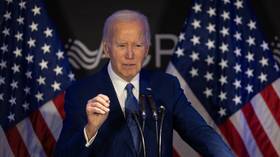NDAA: Indefinite detention stopped? Not so fast
A US judge ruled on Wednesday that the indefinite military detention of American citizens, as allowed in the National Defense Authorization Act that President Barack Obama signed on December 31, 2011, is unconstitutional.
For now, American citizens will be excluded from the NDAA’s nasty laws that allow the government to detain persons with suspected ties to terrorist groups behind bars without ever pressing charges. Civilians the world over still face persecution, however, as the controversial legislation continues to allow for their imprisonment.United States District Judge Katherine Forrest declared this week that the NDAA’s indefinite detention provision has a "chilling impact on First Amendment rights” and formally struck down the section of the legislation that allows for the government to imprison Americans for only supposed terrorist ties. Unless the law is further challenged, though, those outside the US still face the wrath of Uncle Sam for having only suspected links with anti-American forces.Chris Hedges, a reporter with a career that spans stints with outlets such as National Public Radio and The New York Times, added his name to a lawsuit earlier this year challenging the legality of the NDAA. He was among the journalists and civilian activists who were instrumental in challenging the legislation in a court of law.“I have had dinner more times than I can count with people whom this country brands as terrorists,” Hedges wrote earlier this year, “but that does not make me one.”In her ruling this week, Judge Forrest appears to agree, writing, "In the face of what could be indeterminate military detention, due process requires more.”"An individual could run the risk of substantially supporting or directly supporting an associated force without even being aware that he or she was doing so,” she added.Although Judge Forrest’s ruling this week is without a doubt a milestone in terms of revoking the NDAA, her efforts are but only a start in terms of terminating the legislation. It does not rule out the possibility that the Obama administration will appeal her decision, either. Attorney Carl Mayer represented the plaintiffs in this case and tells RT that, although he expects the White House to appeal, "we are suggesting that it may not be in their best interest because there are so many people from all sides of the political spectrum opposed to this law that they ought to just say, 'We're not going to appeal.'"In the meantime, though, Mayer says that Judge Forrest's ruling is a major victory for American civil liberties."The NDAA cannot be used to pick up Americans in a proverbial black van or in any other way that the administration might decide to try to get people into the military justice system. It means that the government is foreclosed now from engaging in this type of action against the civil liberties of Americans."For now, more than 6 billion citizens of foreign nations can still be handcuffed and hauled away to a military prison without ever being brought to trial. This week’s decision may protect Americans from that provision, but unfortunately does nothing to spare both foreign reporters and civilians from a life of imprisonment.Hedges himself applauded the ruling, calling it "a tremendous step forward for the restoration of due process and the rule of law,” reports the Associated Press."Ever since the law has come out, and because the law is so amorphous, the problem is you're not sure what you can say, what you can do and what context you can have,” added Hedges.The judge’s ruling comes, coincidentally, at the same time that the US House Armed Services Committee has passed next year’s National Defense Authorization Act. Congress is expected to begin voting on amendments for next year’s NDAA as early as this this week, but during Wednesday’s opening debates it was revealed that indefinite detention is already included once again in the bill.Presidential hopeful and congressman, Rep. Ron Paul (R-Texas), has signed his name to an amendment proposed by Rep. Adam Smith (D-Washington) and Rep. Justin Amash (R-Michigan) that will shoot down the indefinite detainment of anyone in the next NDAA."Hopefully we can be successful this week in clarifying this to make sure once and for all that we as a people don't endorse the whole notion —which contradicts everything we should believe in — that we could be arrested and put in secret prisons," said Rep. Paul."If we don't change this, believe me, this country is in serious trouble.”















